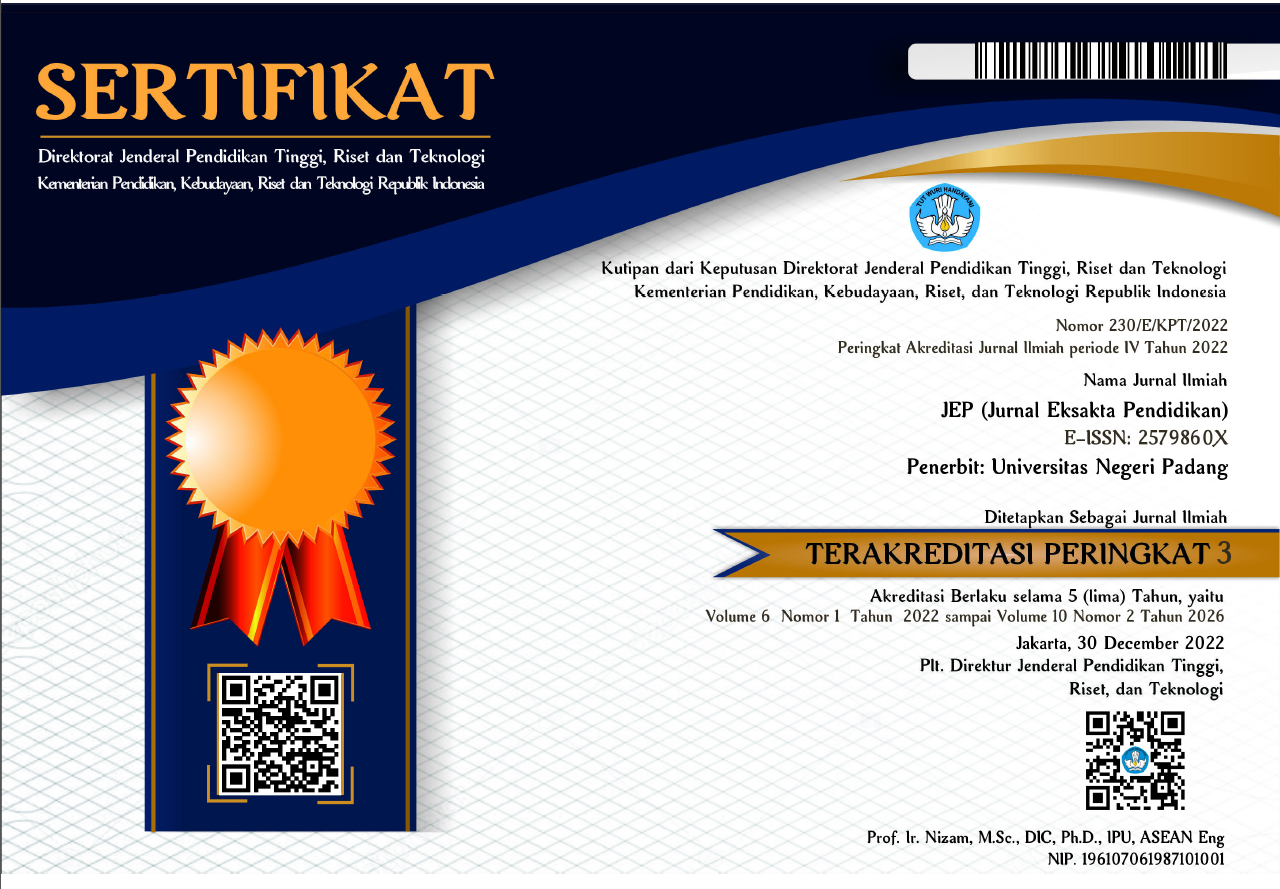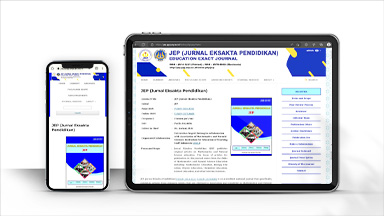Validitas dan Praktikalitas E-Modul Berbasis Inkuiri Terbimbing Terintegrasi Laboratorium Virtual pada Materi Hidrolisis Garam kelas XI SMA/MA
Abstract
E-modules are one of the innovations in the development of teaching materials that can be integrated with virtual laboratories. The learning model that can be applied in the development of e-modules is a guided inquiry learning model . This research aims to produce a salt hydrolisis e-module oriented on guided inquiry learning model integrated with virtual laboratories and reveal the validity and practicality of e-modules. The type of this research is research and development (R&D). the method used in this research is developmental model by using 4-D or 4-P design. They are define, design, develop and disseminate. This research is limited to the stage of development, the validity and practicality test. The data collection instrument is a questionnaire of validity and practicality. The e-module was validated by 6 experts, they are 3 chemistry lectures of FMIPA UNP and 3 chemistry teachers while practicality test was carried out by 2 chemistry teachers and 15 XII grade students of MIPA SMAS Adabiah 2 Padang. data from validity and practicality test results were analyzed using the cohen kappa formula. Based on the results of the study, it was found that average kappa moment of validity test was 0,83 with a very high validity category, the average kappa moment of teacher practicality was 0,82 with a very high practicality category and the average kappa moment students practicality was 0,82 with a very high practicality category. The results of the analysis of students answer on e-module, it was found average of key question was 90%, average of worksheet was 94,8% and average of evaluation test was 90%. Thus, it was concluded that the salt hydrolysis e-module based on guided inquiry learning virtual laboratories integrated was produced was valid and practical.
Downloads
References
Andromeda, A., Lufri, L., Festiyed, F., Ellizar, E., Iryani, I., Guspatni, G., & Fitri, L. (2018). Validity And Practicality of Experiment Integrated Guided Inquiry-Based Module on Topic of Colloidal Chemistry for Senior High School Learning. IOP Conference Series: Materials Science and Engineering, 335
Boslough, Sarah dan Paul A. W. (2008). Statistics In A Nutshell, A Desktop Quick Reference. Beijing, Cambridge, Famham, Köln, Sebastopol, Taipei, Tokyo: O’reilly.
Budiarti, S., Nuswowati, M., Cahyono, E. 2016. Guided Inquiry Berbantuan E-Modul untuk Meningkatkan Keterampilan Berpikir Kritis. Journal of Innovative Science Education, 5(2)
Daryanto. (2014). Pengembangan Perangkat Pembelajaran. Yogyakarta: PT Gava Media.
Depdiknas. (2008). Panduan Pengembangan Bahan Ajar. Jakarta: Departemen Pen-didikan nasional.
Febriyandi, F., & Andromeda, A. (2019). Pengembangan E-Modul Berbasis Inkuiri Terbimbing Terintegrasi Laboratorium Virtual Pada Materi Sistem Koloid Kelas XI SMA/MA. Edukimia, 1(3), 24-30.
Abou Faour, M., & Ayoubi, Z. (2017). The effect of using virtual laboratory on grade 10 students’ conceptual understanding and their attitudes towards physics. Journal Of Education In Science Environment And HEALTH, 4(1), 54-68.
Hamdani.(2011). Strategi Belajar Mengajar. Bandung : CV Pustaka
Hanson, D. M. (2005). Designing process-oriented guided-inquiry activities. Faculty Guidebook-A Comprehensive Tool for Improving Faculty Performance. 2nd ed. Pacific Crest.
Hatherly, P. A. The Virtual Laboratory And Interactivescreen Experiments. http://web.phys.ksu.edu/ diakses tanggal 20 Maret 2020
Kemendikbud. (2020). Panduan Penyelenggaraan Pembelajaran pada Tahun Ajaran dan Tahun Akademik Baru di Masa Covid-19. www.kemdikbud.go.id diakses 8 Agustus 2020
Oidov, L., Tortogtokh, U., & Purevdagva, E. (2012). Virtual laboratory for physics teaching. In International Conference on Management and Education Innovatio, IPEDR (Vol. 37, pp. 319-323).
Saleh, K. F., Mohamed, A. M., & Madkour, H. (2009). Developing virtual laboratories environments for engineering education. International Journal of Arts and Sciences, 3(1), 9-17.
Sanjaya, Wina. (2006). Strategi Pembelajaran Berorientasi Standar Proses Pendidikan. Jakarta: Kencana Prenada Media Group.
Soon, Chong J.L. (2005). The Development and Evaluation of an E-Module for Pneumatics Technology. Journal of Instructional Technology (MOJIT), 2(3)
Suasarna dan Mahayukti. (2013). Pengembangan E-Modul Berorientasi Pemecahan Masalah untuk Meningkatkan Keterampilan Berpikir Kritis Mahasiswa . Jurnal Pendidikan Indonesia, 2(2)
Sudijono, Anas. (2011). Pengantar Evaluasi Pendidikan. Jakarta: PT Raja Grafindo
Sugianto, D., Abdullah, A.G., Elvayanti, S., Muladi, Y. (2013). Modul Virtual: Multimedia Flipbook Dasar Teknik Digital. Jurnal INVOTEC, 9(2)
Trianto. (2010). Model Pembelajaran Terpadu. Jakarta: Bumi Aksara
World Health Organization. (2020) . Timeline: WHO's COVID-19 response. https://www.who.int/ Diakses 8 Agustus 202
Copyright (c) 2020 Fadhillah Fadhillah, Andromeda Andromeda

This work is licensed under a Creative Commons Attribution 4.0 International License.

This work is licensed under a Creative Commons Attribution 4.0 International License.




_(2579-860X).png)
_(2614-1221)1.png)




